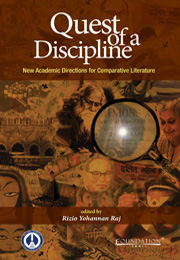Book contents
- Frontmatter
- Contents
- List of Contributors
- Acknowledgements
- Prologue to the “Quest'
- Introduction
- PART I Traditions and Manifestoes: Reflecting on Perspectives
- PART II The Quest Motif: Redefining the Scope of Comparative Literature
- 4 Beyond ‘Other Words’: The ‘Relevance’ of Translatology as Comparative Literature
- 5 Intertextual Lores and the Play of Language: Folklore/Orality in the Comparative Context of Literature
- 6 Towards a Comparative Performance Studies
- 7 Media Studies and the Academic Elite
- 8 Comparative Film Studies: The Culture Studies Turn in Comparative Literature
- 9 Finding Space in the Margin: Teaching Women's Literature in a Comparative Perspective
- PART III The Dynamics of Exchange: Genres, Areas and Disciplines
- PART IV India: A Curious Comparative Space
- Afterword: Comparative? Literature?
- Index
6 - Towards a Comparative Performance Studies
from PART II - The Quest Motif: Redefining the Scope of Comparative Literature
Published online by Cambridge University Press: 05 June 2012
- Frontmatter
- Contents
- List of Contributors
- Acknowledgements
- Prologue to the “Quest'
- Introduction
- PART I Traditions and Manifestoes: Reflecting on Perspectives
- PART II The Quest Motif: Redefining the Scope of Comparative Literature
- 4 Beyond ‘Other Words’: The ‘Relevance’ of Translatology as Comparative Literature
- 5 Intertextual Lores and the Play of Language: Folklore/Orality in the Comparative Context of Literature
- 6 Towards a Comparative Performance Studies
- 7 Media Studies and the Academic Elite
- 8 Comparative Film Studies: The Culture Studies Turn in Comparative Literature
- 9 Finding Space in the Margin: Teaching Women's Literature in a Comparative Perspective
- PART III The Dynamics of Exchange: Genres, Areas and Disciplines
- PART IV India: A Curious Comparative Space
- Afterword: Comparative? Literature?
- Index
Summary
INTRODUCTION
Delivering the Wellek Library Lecture in Critical Theory in May 2000, which now in retrospect can be regarded as a watershed event in the history of Comparative Literary Studies, Gayatri Spivak made the call for ‘a new Comparative Literature,’ but on publishing the same nearly three years later, she described it as the ‘last gasp of a dying discipline’ and even more provocatively titled the book Death of a Discipline.
Whether one agrees with such Cassandraesque prognostications of ‘imminent death’ or not, it is fairly obvious that Comparative Literature as a discipline is in a state of acute crisis, with a profound tension regarding its very rationale residing at the heart of most attempts to salvage it for a continued space in academic transactions within the Humanities. This feeling of crisis characterises many if not most attempts to reflect on the current and the possible future states of the discipline. In that sense, even at the cost of becoming remarkably unpopular, I would venture to say that even this assembly here is but a reflection of the same crisis and tension.
A classic instance of this tension can be found in Haun Saussy's unpublished draft of his 2004 ACLA Report.
Information
- Type
- Chapter
- Information
- Quest of a DisciplineNew Academic Directions for Comparative Literature, pp. 110 - 120Publisher: Foundation BooksPrint publication year: 2012
